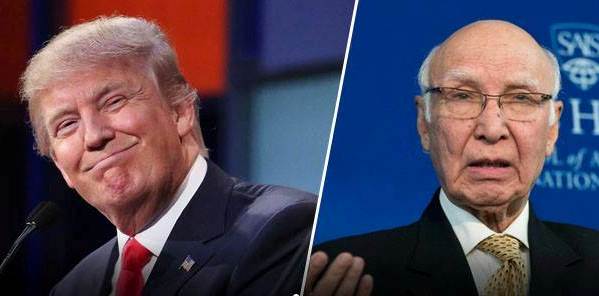“Pakistan is not particularly concerned about the possibility of a Republican presidential candidate Donald Trump occupying the White House or his proposal to ban all Muslims from entering the United States,” Prime Minister Nawaz Sharif’s Adviser on Foreign Affairs Sartaj Aziz insisted earlier yesterday.
“What you do in the campaign doesn’t mean that it becomes policy,” Aziz told CNN, while in Washington to meet US officials.
Responding to Trump’s remarks about Pakistan’s nuclear arsenal in the Fox News debate on Thursday, Aziz said, “The United States should stay in Afghanistan but not because of his country’s nuclear weapons. In our view, a sudden withdrawal would not be advisable”.
Trump had cited Pakistan’s nuclear weapons as the reason for the United States to stay in Afghanistan.
Although some 195,000 Afghan troops have been trained by the US military, Aziz cited the country’s lack of an air force to support ground forces in operations against the Taliban as a leading reason for US forces to stay in the country.
Speaking about Trump’s call to ban Muslims from entering the US, Aziz said that Pakistan viewed America as a multicultural society that is too rooted in the ideals of tolerance for such a ban to ever be enacted.
“The strength of these values in America is very strong. Even if, you know, for political reasons or short-term popularity somebody espouses these ideas to appeal to one segment of the population, the broad spectrum of America … will not buy this,” PM’s adviser said.
Aziz also gave a speech at the Council on Foreign Relations (CFR), saying that peace negotiations between the Afghan government and Taliban could begin in the coming week or two. Further, he acknowledged that the Taliban leadership was inside Pakistan, giving leverage to his government to pressure them to come to the table.
“We have some influence in them because their leadership is in Pakistan,” he said. “They get some medical facilities. Their families are here.”
He added that Pakistan did not see the Taliban as able to achieve victory on the battlefield on the ground but said the group was capable of continuing their insurgency for an “indefinite period.”
“That’s why peace in Afghanistan can come only through a reconciliation process,” Aziz urged.
The PM’s adviser further said that he did not consider Islamic State (IS) to be a major threat in the region, saying that there was no “organized structure or presence” of the group in Pakistan and that IS groups in Afghanistan were simply local Pakistani Taliban splinter groups with no connection to Iraq and Syria that had opted to rebrand in an attempt to raise money.
This article originally appeared on CNN.






